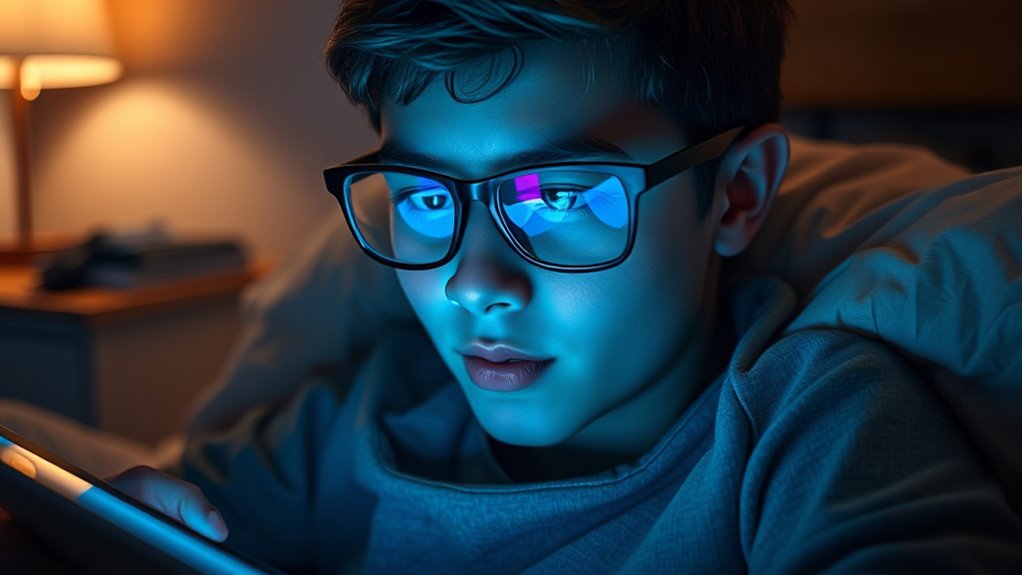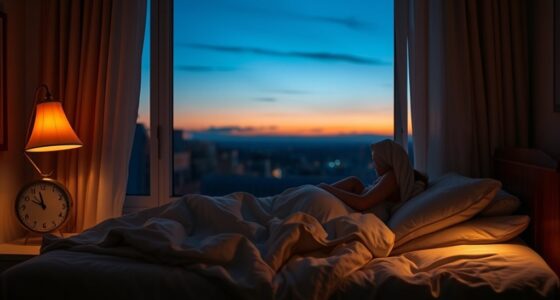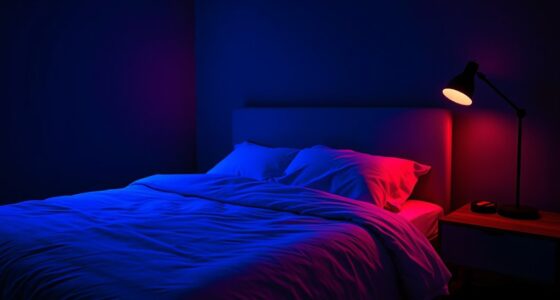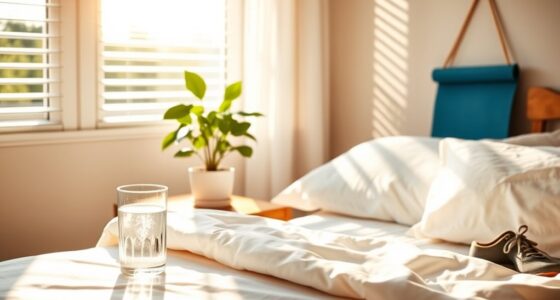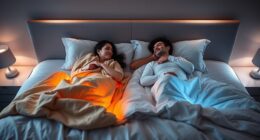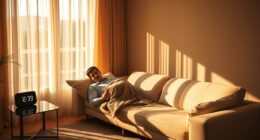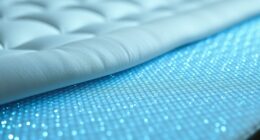Using blue-light glasses at bedtime can help reduce blue light exposure from screens, which may otherwise suppress melatonin and delay sleep. These glasses filter out some of the blue light, supporting your body’s natural sleep signals. However, their effectiveness varies depending on the glasses and how much screen time you have. If you want to learn more about how to protect your sleep and optimize your bedtime habits, keep exploring how managing screen use impacts your rest.
Key Takeaways
- Blue-light glasses can reduce blue light exposure, helping to minimize melatonin suppression before bed.
- They are more effective when combined with other strategies like lowering screen brightness and using night mode.
- The effectiveness varies depending on the quality of the glasses and the amount of blue light filtered.
- Wearing blue-light glasses before bedtime supports natural sleep signals and may improve sleep quality.
- They are a practical tool to protect sleep, especially when screen use can’t be completely avoided close to bedtime.
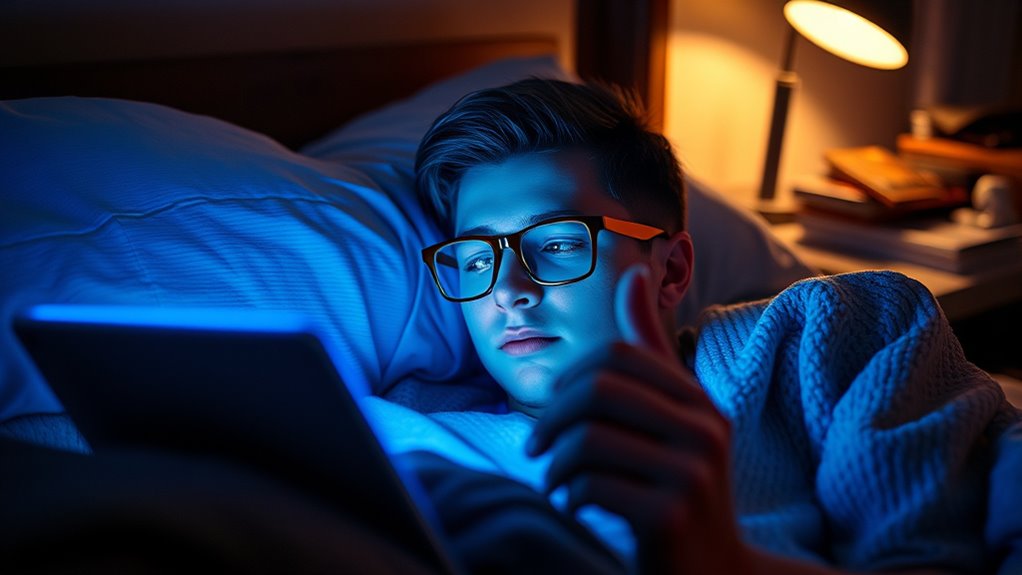
Have you ever wondered how screen time before bed affects your sleep? When you spend time on your phone, tablet, or laptop late at night, you’re exposing yourself to blue light, which can substantially impact your ability to fall asleep. One of the main ways this happens is through the impact on melatonin, the hormone responsible for regulating your sleep-wake cycle. Melatonin levels naturally rise in the evening, signaling to your body that it’s time to wind down. However, blue light exposure from screens suppresses melatonin production, making it harder for you to feel sleepy and delaying your sleep onset. The longer you stay on your devices, the more you interfere with this natural process, often resulting in shorter sleep duration and poorer sleep quality.
Screen brightness effects also play an essential role in how your body responds to late-night screen use. Higher screen brightness amplifies the blue light exposure, intensifying its suppressive effect on melatonin. Even if you’re using a device in a dimly lit room, a bright screen can trick your brain into thinking it’s daytime, further disrupting your circadian rhythm. This disruption can lead to difficulty falling asleep, fragmented sleep, and feeling less rested in the morning. It’s not just about the blue light itself but also how bright your screen is that influences your sleep quality. Many devices now have night mode or blue light filtering features, but their effectiveness varies. If you keep your screen brightness high or don’t use these filters, you’re more likely to experience negative effects on your sleep.
Understanding how screen brightness effects and the impact on melatonin work together can help you make smarter choices about your bedtime habits. Lowering your screen brightness or activating night mode can substantially reduce blue light exposure, giving your melatonin a chance to do its job. Wearing blue-light glasses may also help, especially if you need to use devices close to bedtime. These glasses filter out some of the blue light, lessening its influence on melatonin suppression. Additionally, integrating automated device management solutions can help regulate screen usage and brightness in the evening. Ultimately, reducing screen time before bed might be the most effective way to improve your sleep, but if you must use screens, managing brightness and blue-light exposure is a practical step. By making these adjustments, you’ll support your body’s natural sleep signals and enjoy more restful, uninterrupted sleep.
Frequently Asked Questions
Do Blue-Light Glasses Work Instantly or Require Regular Use?
You might wonder if blue-light glasses give instant benefits or need regular use. While some people notice immediate improvements in eye comfort and reduced glare, long-term effects on sleep quality typically require consistent, ongoing use. Wearing them regularly helps your body adjust to less blue light exposure, leading to better sleep over time. So, for lasting results, make blue-light glasses a daily habit rather than expecting instant changes.
Are Blue-Light Glasses Effective for Children’S Sleep?
You might wonder if blue-light glasses truly improve children’s sleep. While they can help reduce eye strain and protect eye health, their impact on sleep varies. For healthy child development, limiting screen time before bed remains essential. Blue-light glasses can be a helpful tool, but they’re most effective when combined with good sleep habits. Always consult a pediatrician to guarantee they support your child’s overall well-being and eye health.
Can Blue-Light Glasses Improve Sleep Quality in Shift Workers?
You might wonder if blue-light glasses can improve sleep quality for shift workers. While they’re mainly known for reducing eye strain, they could also support better sleep by blocking blue light that disrupts your circadian rhythm. Wearing these glasses may boost your workplace productivity during night shifts and help you relax afterward. However, more research is needed. Still, they’re a simple way to protect your eyes and possibly enhance sleep.
Do All Blue-Light Glasses Block the Same Amount of Light?
Not all blue-light glasses block the same amount of light because of differences in lens coatings and frame styles. Some lenses have stronger coatings that filter more blue light, while others are lighter or clear, offering less protection. Frame styles also matter; larger frames may cover more of your eye area, enhancing filtering. So, choose glasses with specific lens coatings and suitable frame styles to maximize blue-light blocking.
Are There Any Side Effects From Wearing Blue-Light Glasses Regularly?
You might wonder if wearing blue-light glasses regularly has side effects. While most people experience no issues, some report eye strain or skin irritation around the frames after prolonged use. These effects are usually mild and temporary, but if you notice discomfort, it’s wise to take breaks or choose glasses with softer materials. Overall, blue-light glasses are safe for everyday wear, with minimal risk of adverse side effects.
Conclusion
So, next time you’re tempted to scroll before bed, consider wearing blue-light glasses. Imagine Sarah, who started using them and found it easier to fall asleep after late-night screen time. While they might not be a miracle cure, they can help reduce eye strain and improve your sleep quality. Ultimately, combining glasses with good sleep habits creates the best chance for restful nights. Give it a try—you might just wake up feeling refreshed.
